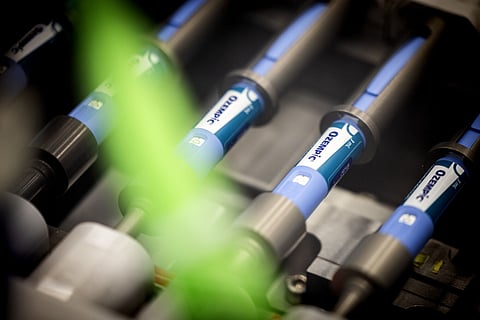Ozempic, Cetaphil makers brace for impact from Trump tariffs
Novo Nordisk A/S, maker of Wegovy for obesity and Ozempic, isn’t “immune” to tariffs

The European makers of Ozempic for diabetes and Cetaphil for dry skin said they would feel an impact from President Donald Trump’s threatened tariffs, adding to a chorus of warnings from executives.
Novo Nordisk A/S, which makes Wegovy for obesity as well as Ozempic, isn’t “immune” to tariffs, Chief Executive Officer Lars Fruergaard Jorgensen said Thursday, despite pouring billions into US production. Over the longer term, the Danish company expects to make more medicines for the US market inside the country, and last year announced plans for a $4.1 billion factory in North Carolina.
“We still have products moving across borders like most global companies,” Jorgensen said. “Of course there’ll be some short-term impact as we mitigate the impact of tariffs.”
Trump has threatened 25 per cent levies on the European Union, and pharmaceuticals, cars and agriculture have been identified as industries of particular concern. He wants to draw manufacturing to the US, though executives have warned the actual effect could be more complex and that US patients and consumers may lose access to some products.
The US this week also applied 25 per cent tariffs on imports of goods from Canada and Mexico, though Trump later paused the levies on autos. He also increased tariffs on China to 20 per cent.
Even when drugmakers produce in the US, the ingredients for medicines often come from abroad, Jorgensen said.
“By far the largest drug category is generic medicines,” he said. “If you put tariffs on those, I have a hard time seeing that that is not going to lead to other shortages of medicine or increased pricing in general.” Novo’s shares fell as much as 3.5 per cent after Jorgensen’s comments, leaving them 28 per cent lower over the past 12 months.
‘Another Challenge’
Swiss skincare company Galderma Group AG — maker of the popular skin cream Cetaphil — said Thursday it could shift some of its consumer business sales to markets outside the US to mitigate some of the effects of tariffs.
“I see tariffs as just another challenge that you have to overcome,” CEO Flemming Ornskov said in an interview on Thursday. “We always have the opportunity to shift sales to the international markets where we have very, very strong progress.”
Still, Ornskov said the US market is very attractive, and that Galderma is taking market share from competitors, including US rival AbbVie Inc.
The US makes up around 40 per cent of Galderma’s sales, and analysts estimate Cetaphil represents about 9 per cent of its sales in the country.
Galderma’s shares dropped as much as 9.3 per cent on Thursday, the most since its stock market debut on March 22. The stock is still up 64 per cent since the listing, buoyed by optimism the Swiss company’s fillers and creams will be sought after by people who have slack skin after using obesity drugs.
“US tariffs that have come into force could have a significant impact on Galderma, as it produces its star product Cetaphil for the US market in Canada,” said Chris Lukaszek, the head of Swiss sales at Kepler Cheuvreux.
The CEO comments echoed a warning Wednesday by the chief of Sandoz Group AG, one of the world’s largest makers of generic medicines. The tariffs will probably make drugs more expensive and limit access for patients since most generics and biosimilars sold in the US contain ingredients made elsewhere or are produced entirely abroad, Richard Saynor, the CEO, said in an interview with Bloomberg TV.
More than a third of Swiss exports come from the pharmaceutical industry, making it a major contributor to the Swiss economy.



